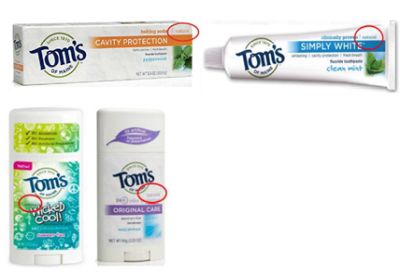The Bottom Line
- A recent decision indicates that "natural" product claims do not necessarily mean that the product contains no synthetic and/or highly processed ingredients.
- "Natural" claims continue to be a focus of consumer class actions, and companies making "natural" claims should ensure that they understand and are managing this risk.
- Depending on the court, precedent may vary as to whether a challenge to a claim of "natural" can proceed to trial.
In a departure from several California court rulings on the same issue, a New York federal judge has decertified three classes of consumers seeking to recover damages for allegedly deceptive "natural" labeling claims on Tom's of Maine toothpaste and deodorant products. The judge also granted summary judgment dismissing the named plaintiffs' claims.
While the plaintiffs alleged that synthetic or highly processed ingredients rendered "natural" claims deceptive, U.S. District Judge Kimba Wood, sitting in the Southern District of New York, held that reasonable consumers differ in their understanding of the word "natural" when used to describe personal care products. Therefore, she found that those consumers would not necessarily believe that "natural" toothpaste or deodorant is free of any synthetic or highly chemically processed ingredients, and, accordingly, that the named plaintiffs could not prove their breach of warranty or false advertising claims based on the inclusion of synthetic or processed ingredients in the products.
Plaintiffs Allege Tom's Labels Don't Pass the Smell Test
Plaintiffs Anne de LaCour, Andrea Wright and Loree Moran brought their claims against Colgate-Palmolive Co. and its subsidiary, Tom's of Maine, Inc., based on the Tom's toothpaste and deodorant labels. They alleged that Tom's designation of its products as "natural" on those labels is false and misleading because the products contain synthetic and/or "highly chemically processed ingredients," such as aluminum chloralhydrate, glycerin, propylene glycol, sodium lauryl sulphate, sorbitol and xylitol. The plaintiffs claimed that "natural" representations on the packaging induced them and their fellow consumers to pay a premium price for these toothpastes and deodorants on the mistaken belief that they contained no artificial ingredients.

As seen in De Lacour v. Colgate-Palmolive Co., 16-CV-8364 (KMW) (S.D.N.Y. Jan. 3, 2024)
After failing to secure a nationwide class of plaintiffs in 2018, the plaintiffs in 2020 convinced the court to certify three smaller subclasses consisting of those consumers who purchased the covered products in California, Florida or New York. Over two years later, with discovery in the case complete, Tom's and Colgate moved to decertify those three subclasses of absent plaintiffs and sought summary judgment from the court dismissing the named plaintiffs' claims. Specifically, Tom's and Colgate argued that the plaintiffs failed to offer evidence that a reasonable consumer would necessarily interpret "natural" in the context of toothpaste or deodorant to mean that those products contained no synthetic or highly chemically processed ingredients.
Reviewing all the evidence the plaintiffs offered, the judge agreed with Tom's and Colgate.
What is "Natural"
Under the deceptive practices and false advertising laws of all three states, the key issue is whether the advertising or packaging would mislead a reasonable consumer – meaning that a significant portion of the target audience, acting reasonably in the circumstances, could be misled. Similarly, a claim for breach of express warranty cannot succeed unless the plaintiff demonstrates a false or misleading statement by the defendant about the product.
The plaintiffs offered four main categories of evidence in support of their argument that toothpaste and deodorant consumers understand "natural" to mean "no synthetic or highly chemically processed ingredients:"
- an expert report detailing the findings of two consumer perception studies,
- governmental agencies' definitions of "natural,"
- testimony of the named plaintiffs, themselves and
- statements by Tom's employees.
The court reviewed each of these and found that none of them could support any potential judgment in the plaintiffs' favor.
First, the court examined the expert's consumer perception surveys. Those surveys asked consumers whether the labels conveyed that the products contained only "natural" ingredients, or only "artificial" ingredients or some combination of the two. The court found that the surveys were flawed — and inadmissible — because they failed to define these ambiguous terms except in reference to each other. Therefore, no meaningful conclusion could be drawn from the survey results.
Next, the court concluded that there is no guidance from the government as to what "natural" means on personal care products. Specifically, the court emphasized that attempts by the U.S. Department of Agriculture and the U.S. Food and Drug Administration to define "natural" solely with respect to food products have not resulted in a consistent definition of "natural." Considering these differing definitions, as well as the fact that no agency has defined "natural" in the context of personal care products, the court determined that the plaintiffs could not rely on governmental guidance to demonstrate what constitutes a reasonable consumer's understanding of the word "natural" in connection with a deodorant or toothpaste.
Finally, the court found that neither the testimony nor documents and evidence submitted necessarily reflected consumers' understanding of the term "natural'.
When Nature Calls: A Costly Proposition
This decision shows that certain courts will put plaintiffs to their proof before allowing a "natural" labeling claim to proceed to trial. But like many similar cases, this victory still came only after over six years of costly litigation. Indeed, there is a significant body of "natural" case law in other jurisdictions, including California, in which courts are often willing to let this type of case go through extensive discovery before entertaining any potentially dispositive motion. Therefore, companies considering "natural" claims – on product labeling or in other forms of advertising – still face a considerable risk of class action challenges.
The content of this article is intended to provide a general guide to the subject matter. Specialist advice should be sought about your specific circumstances.




